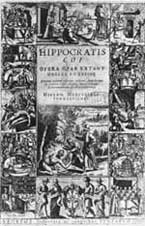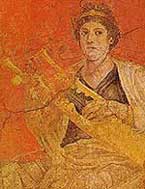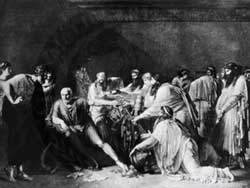The Beginnings of Modern Medicine: Greece
|
|
Image courtesy of National Library of Medicine.
The painting "Hippocrate Refusant Les Presents D’Artaxerces' by French painter Anne-Louis Girodet de Roussy-Trioson (1767-1824) shows Hippocrates turning down gifts for his services as a physician. |
The humoral theory notwithstanding, Hippocrates is often described as the "father of modern medicine." He and his followers wrote more than 70 surviving works in which they summarized a medicine based on reason. They also laid down many of the principles of modern medical practice. For example, they argue that disease may be due not only to internal causes but to outside influences such as climate, personal hygiene, diet, and activity. They urge the close observation of patients, using touch, smell, taste, and hearing, and the preparation of written case histories. Therapy should be simple, relying mostly on bathing and diet, with some use of drugs and rarely, surgical intervention. Above all, the physician should be ethical, working not for gain but for the benefit of the sick. These ethical requirements are embodied in the so-called Hippocratic Oath, which continues to be administered at most medical schools.
The basis of western medical tradition
The scientific approach to medicine was advanced by Aristotle, the great Greek philosopher of the 4th century BCE. Aristotle was the first to study anatomy by dissecting animals and studying the organs. Because he used animals, however, he wrongly concluded that the human heart has three chambers, like that of amphibians.
The first dissections of the human body occurred in Alexandria, Egypt. By the 3d century BCE Alexandria had become the cultural capital of the Hellenic world, the sphere of Greek political influence established by the (mostly Asian) conquests of Alexander the Great (who incidentally was tutored by Aristotle). There the great Alexandrian Library became the depository of learning from far and wide.
 Image courtesy of National Library of Medicine Hippocrates authored a number of medical texts, including Duties of a Physician. The cover page seen here is from a later edition. |
 Image courtesy of Charles Savona Ventura and Victor E. Grech, "Concepts in Cardiology: A Historical Perspective"Images in Paediatric Cardiology 1999;1:22-31. Herophilus, a physician in Alexandria, Egypt, dissected many human bodies to learn about human anatomy. He also recognized the relationship between the pulse and the heart. |
A physician named Herophilus conducted the first known dissections of the human body. According to legend, he was allowed to dissect live criminals who had been sentenced to death. Whether or not this is true, he learned a great deal about human anatomy. Herophilus discovered and named the prostrate and duodenum. He also determined that the arteries were filled with blood, not air, as was commonly believed. In addition, he recognized the importance of the brain as the center of the nervous system and the seat of intelligence, and delineated the nervous system, distinguishing motor from sensory nerves.
![header=[Connected Wisdom: System Integrity] body=[The main elements of the nervous system are the nerves, spinal cord, and brain. All three work together as a system to control just about all bodily functions, including walking, talking, breathing, and the senses. To learn more about the integrity of systems, click here. ] delay=[100] fade=[off] Living Systems](/sites/default/files/uploadedimages/Science/Features/Learning_Through_Storytelling/living_systems_100px_notxt.gif?n=6460) LIVING SYSTEMS |
The medical traditions developed in Greece were adopted by the ancient Romans.
This content has been re-published with permission from SEED. Copyright © 2026 Schlumberger Excellence in Education Development (SEED), Inc.


